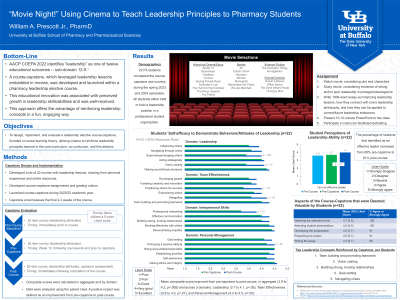Pharmacy Practice
(8) “Movie Night!” Using Cinema to Teach Leadership Principles to Pharmacy Students


William A. Prescott, Jr., Pharm.D. (he/him/his)
Clinical Professor and Chair, Department of Pharmacy Practice
University at Buffalo, The State University of New York
Buffalo, New York, United States
Primary Author(s)
Objective : The AACP Curriculum Outcomes and Entrustable Professional Activities (COEPA) 2022 identified “leadership” as one of twelve educational outcomes. The objective of this study was to design, implement, and evaluate a leadership elective course-capstone utilizing cinema to reinforce leadership principles learned in the core-curriculum, co-curriculum, and this elective.
Methods: The course-capstone offered during academic years 2021/22 and 2022/23, which was founded on social learning theory, entailed each student studying a movie with ingrained leadership principles, writing a structured essay, and providing a 10-12-minute presentation, during the final two weeks of the course. Surveys using 5-point Likert scales were administered pre-course, at week 12 of 15 (pre-capstone), and post-capstone to assess for change in students’ self-efficacy to demonstrate behaviors/attitudes of leadership; data were analyzed using the paired t-test. A positive impact of the capstone was defined as improvement from pre- to post-capstone.
Results: Twenty-two third-year PharmD students completed the capstone and surveys. At baseline, 59% of students self-identified as an “effective leader.” The percentage of students that identified as such increased from 68% pre-capstone to 91% post-capstone (p <.01). A statistically significant improvement in student self-efficacy for all 23 assessed leadership behaviors/attitudes was observed pre- to post-course, with additional improvement demonstrated pre-to post-capstone for six (26.1%) items: attitude, networking, vision casting, supervising/managing, positioning others for success, and delegating (p <.05). All capstone elements were deemed valuable by student-participants (Likert scores 4.3-4.7).
Conclusions: The course-capstone, which leveraged leadership lessons embedded in movies, was associated with perceived growth in leadership skills/abilities among students and was well-received. This approach offers the advantage of reinforcing leadership concepts in a fun, engaging way, but is best-suited for small-group discussion and necessitates adaptation for use in the core-curriculum.
Methods: The course-capstone offered during academic years 2021/22 and 2022/23, which was founded on social learning theory, entailed each student studying a movie with ingrained leadership principles, writing a structured essay, and providing a 10-12-minute presentation, during the final two weeks of the course. Surveys using 5-point Likert scales were administered pre-course, at week 12 of 15 (pre-capstone), and post-capstone to assess for change in students’ self-efficacy to demonstrate behaviors/attitudes of leadership; data were analyzed using the paired t-test. A positive impact of the capstone was defined as improvement from pre- to post-capstone.
Results: Twenty-two third-year PharmD students completed the capstone and surveys. At baseline, 59% of students self-identified as an “effective leader.” The percentage of students that identified as such increased from 68% pre-capstone to 91% post-capstone (p <.01). A statistically significant improvement in student self-efficacy for all 23 assessed leadership behaviors/attitudes was observed pre- to post-course, with additional improvement demonstrated pre-to post-capstone for six (26.1%) items: attitude, networking, vision casting, supervising/managing, positioning others for success, and delegating (p <.05). All capstone elements were deemed valuable by student-participants (Likert scores 4.3-4.7).
Conclusions: The course-capstone, which leveraged leadership lessons embedded in movies, was associated with perceived growth in leadership skills/abilities among students and was well-received. This approach offers the advantage of reinforcing leadership concepts in a fun, engaging way, but is best-suited for small-group discussion and necessitates adaptation for use in the core-curriculum.

.png)